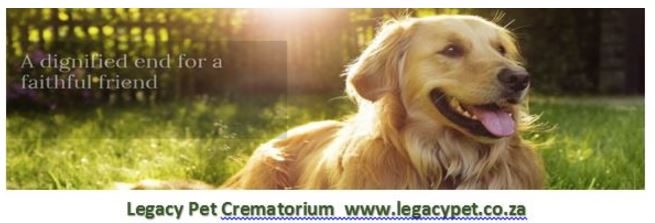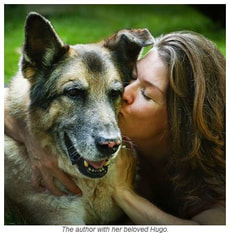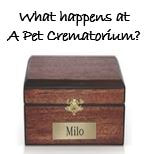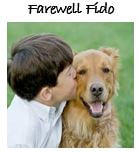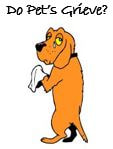Has Grief for a Dog Who Died Ever Overwhelmed You?
by Lisa Plummer Savas - www.dogster.comwww.dogster.com
(This is a great site with a large variety of articles, do have a browse when you have time)
When my German Shepherd, Hugo, died, it felt like a part of me had been clawed out and torn away. I talked to a pet-loss expert -- here's what she said.
As I buried my face in his thick, furry neck, I felt my dog take his very last breath. Hugo, my beautiful 14-year-old German Shepherd, was gone. Lying with him in his bed, spooning his now motionless body, I sobbed with an intensity that shook me deeply. I realized I was crying harder than I had in years, my grief so intense, it felt as if a part of me had been clawed out and torn away.
Hugo was the first dog I’d raised from cradle to grave. I had had other dogs before him, but what I had with Hugo was different. He was born the night my father died, so I somehow imagined he had come into my life to watch over me. Intensely challenging to raise, fear aggressive from an early age, and overly protective of me at times, Hugo forced me to become a more patient, compassionate person, to work with his issues but to also accept him for who he was. He was my baby, and I was his mom. He saw me through some very difficult and tumultuous times, and he was a constant, steady presence in my life, always there to lick away my tears. I adored him, and in return he gave me his undying loyalty and devotion.
As I buried my face in his thick, furry neck, I felt my dog take his very last breath. Hugo, my beautiful 14-year-old German Shepherd, was gone. Lying with him in his bed, spooning his now motionless body, I sobbed with an intensity that shook me deeply. I realized I was crying harder than I had in years, my grief so intense, it felt as if a part of me had been clawed out and torn away.
Hugo was the first dog I’d raised from cradle to grave. I had had other dogs before him, but what I had with Hugo was different. He was born the night my father died, so I somehow imagined he had come into my life to watch over me. Intensely challenging to raise, fear aggressive from an early age, and overly protective of me at times, Hugo forced me to become a more patient, compassionate person, to work with his issues but to also accept him for who he was. He was my baby, and I was his mom. He saw me through some very difficult and tumultuous times, and he was a constant, steady presence in my life, always there to lick away my tears. I adored him, and in return he gave me his undying loyalty and devotion.
But now here I was, holding Hugo’s old, crippled body in my arms and showering his grizzled head with tears and kisses, remembering when only 14 years ago I had taken that fuzzy little sable puppy in my arms for the first time and declared, “He’s perfect!” Because he was.
As his body began to grow cold and we waited for the pet crematory funeral director to arrive, it dawned on me that the depth of my sadness far surpassed anything I had felt when my human friends had died. In fact, I had just lost a close girlfriend the month before to cancer, yet I had not felt this level of grief. Was there something wrong with me, or was I experiencing something akin to what one might feel when losing a child?
Bewildered and curious about this phenomenon, I later consulted my friend Betty Carmack, author of Grieving the Death of a Pet and pet-loss support-group counselor at the San Francisco SPCA, a volunteer position she had recently retired from after 32 years.
No, I wasn’t weird, she said. In fact, my feelings were far from uncommon.
“That was a theme I heard consistently in my group, that people were grieving more for their pet than they ever did for their parents, sibling, or friend, that the grief they felt for their animal was like no other grief,” Betty said. “That’s because of the relationship we have with our animals — it’s unconditional love, it’s deep, and it doesn’t carry all the baggage that human relationships carry. Then there’s that loving, that mothering, that caregiving that people do for their animals. I heard people say all the time: ‘She was like my baby, she was like my child.'”
As his body began to grow cold and we waited for the pet crematory funeral director to arrive, it dawned on me that the depth of my sadness far surpassed anything I had felt when my human friends had died. In fact, I had just lost a close girlfriend the month before to cancer, yet I had not felt this level of grief. Was there something wrong with me, or was I experiencing something akin to what one might feel when losing a child?
Bewildered and curious about this phenomenon, I later consulted my friend Betty Carmack, author of Grieving the Death of a Pet and pet-loss support-group counselor at the San Francisco SPCA, a volunteer position she had recently retired from after 32 years.
No, I wasn’t weird, she said. In fact, my feelings were far from uncommon.
“That was a theme I heard consistently in my group, that people were grieving more for their pet than they ever did for their parents, sibling, or friend, that the grief they felt for their animal was like no other grief,” Betty said. “That’s because of the relationship we have with our animals — it’s unconditional love, it’s deep, and it doesn’t carry all the baggage that human relationships carry. Then there’s that loving, that mothering, that caregiving that people do for their animals. I heard people say all the time: ‘She was like my baby, she was like my child.'”
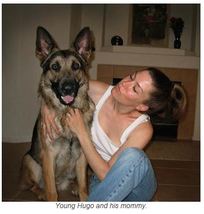
During the holiday season, I missed Hugo so terribly. I longed to be in his magnificent presence, to laugh at his silly antics, to feel those lion eyes watching my every move. Yes, I had my three other dogs to fawn over and adore, but the house wasn’t the same. My husband, friends, and family were so kind and understanding, and I was surrounded by love, compassion, and gestures of caring. Yet I ached.
And then a little nagging thought began to cloud my mind: Had I done everything I could for my boy, who had suffered from terrible, debilitating arthritis in his last year? I thought I had followed every medical, natural, and pharmaceutical protocol known to man, but was there something else I could have done?
Betty assured me that these moments of self-doubt and guilt are also very common for people, especially when their pets have died from illness or old age.
“Some people would come to the group questioning themselves and thinking that maybe they didn’t do enough or didn’t do as well for their animal as they could have,” Betty said. “But when they would tell their story about what they did do for their animal, people would say to them, ‘You did so much for him’ or ‘He was so lucky to have you, that you loved him that much.'”
“To get that kind of feedback and support was so comforting and healing for people going through those kinds of difficult feelings,” Betty said.
While I had enough support at home to help me through my grief, I could see the incredible value in joining a group like Betty’s to work through the roller coaster of emotions I was experiencing. I felt so grateful for the people my life who understood and could relate to my pain, imagining how terrible it would be that if instead of sympathetic eyes and warm hugs I had been met with blank stares or, even worse, comments like, “Well, can’t you just go get another dog?”
What would I have done then?
Betty reminded me that while Western society has definitely come a long way when it comes to acknowledging the significance of losing a pet, there are still those who don’t understand how deep and intense that pain can be, and as a result they may trivialize those feelings.
And then a little nagging thought began to cloud my mind: Had I done everything I could for my boy, who had suffered from terrible, debilitating arthritis in his last year? I thought I had followed every medical, natural, and pharmaceutical protocol known to man, but was there something else I could have done?
Betty assured me that these moments of self-doubt and guilt are also very common for people, especially when their pets have died from illness or old age.
“Some people would come to the group questioning themselves and thinking that maybe they didn’t do enough or didn’t do as well for their animal as they could have,” Betty said. “But when they would tell their story about what they did do for their animal, people would say to them, ‘You did so much for him’ or ‘He was so lucky to have you, that you loved him that much.'”
“To get that kind of feedback and support was so comforting and healing for people going through those kinds of difficult feelings,” Betty said.
While I had enough support at home to help me through my grief, I could see the incredible value in joining a group like Betty’s to work through the roller coaster of emotions I was experiencing. I felt so grateful for the people my life who understood and could relate to my pain, imagining how terrible it would be that if instead of sympathetic eyes and warm hugs I had been met with blank stares or, even worse, comments like, “Well, can’t you just go get another dog?”
What would I have done then?
Betty reminded me that while Western society has definitely come a long way when it comes to acknowledging the significance of losing a pet, there are still those who don’t understand how deep and intense that pain can be, and as a result they may trivialize those feelings.
“That can be part of the sadness, when someone negates a relationship that was so vitally important to you,” Betty said. “I would always tell people to only put their grief out where they know it’s going to be respected and treated tenderly, because it’s too private and too personal to let it get trampled on. I would then encourage them to find that one person, that one friend with whom they could share their feelings, someone who would respect and honor their grief.”
Here are some other helpful suggestions Betty shared with me for coping with my pain:
Two months later, I am still hurting over the loss of my Hugo, but I am finding ways to honor his memory and focus mostly on the good times we shared. I still look for him in the house at times, thinking he’s right there next to me, eager to give me kisses and whining for my attention. To me, he was a person in a dog suit, a special being who opened my heart as it has never been opened before. Because of Hugo, I know I am forever changed for the better.
Here are some other helpful suggestions Betty shared with me for coping with my pain:
- Be compassionate, loving, and gentle with yourself. You just experienced a major loss and have every right to be upset and to grieve, for as long as it takes to heal.
- Allow yourself to feel your emotions — the good, bad, and ugly. Acknowledging your feelings will help you process the loss, so if you’re angry about your dog’s death, let yourself vent those frustrations.
- Cherish the warm and funny memories. Remember when your dog did something naughty or silly and let yourself laugh. Laughter can be extremely healing!
- Memorials, rituals, and tributes are great ways to honor your dog and work through your grief. Put together a photo album or scrapbook, journal about your dog, write poetry and songs, create a memory garden. Many pet crematories and cemeteries offer myriad services and products to help comfort pet owners, including online forums where people can make tributes as well as beautiful urns, keepsakes, and jewelry to hold pet remains.
- If you’re finding it difficult to move through your grief, consider finding a pet loss support group, online chat room, or a counselor. You don’t have to go through this alone. There are numerous groups, hotlines, online sites, and books available to help validate your feelings and guide you through your pain.
Two months later, I am still hurting over the loss of my Hugo, but I am finding ways to honor his memory and focus mostly on the good times we shared. I still look for him in the house at times, thinking he’s right there next to me, eager to give me kisses and whining for my attention. To me, he was a person in a dog suit, a special being who opened my heart as it has never been opened before. Because of Hugo, I know I am forever changed for the better.
If you have lost a beloved pet and would like to honour their memory - do send us a picture and some words and we would be delighted to put them up on our Wall of Remembrance - they will be in very good company. [email protected]
|
What Happens at a Pet Crematorium?
The next step in your pet's journey after you have said goodbye. |
Farewell Fido
Helping kids to come to terms with the loss of a pet and what to tell them and help them to cope. |

